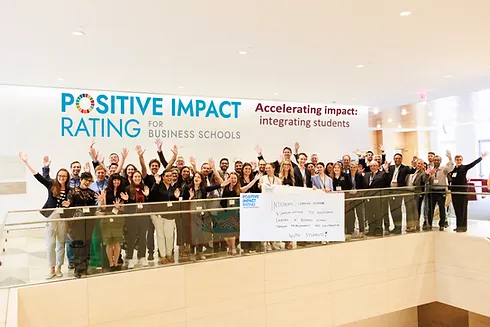Melbourne’s Monash Business School has achieved the second highest possible rating in the latest edition of the Positive Impact Report (PIR) which lets students assess their business school on how they perceive their positive impact on the world.
The societal impact levels of 69 business schools from 25 countries were announced by Prof Thomas Dyllick of the Positive Impact Rating Association at the recent United Nations Principles for Responsible Management Education (PRME) Global Forum in New York.
The PIR is a rating conducted by students, for students and is designed to go beyond their contribution to business and the economy and address the need for a positive societal impact.
Monash was awarded a Level 4 “Transforming” school rating. Only seven business schools – five of which were in India – achieved the top level 5 “Pioneering” rating.
The data collection was organised by student associations, which distributed surveys across campuses. The PIR gives the students a platform to assess the positive impact of their schools, providing a unique opportunity for their voices to be heard. The PIR is the only rating worldwide in which students assess their business schools on their positive impact.
The fourth edition of the PIR appears at a time when societal impact and purpose have become the new focus not only for business, but also for business schools. This reflects in many developments in education, research, school governance, and management.
EQUIS and AACSB, the two leading international business school accreditation systems, have recently integrated societal impact and sustainability into their respective demands for accrediting business schools.
EQUIS demands that schools should have a clear understanding of their role as a “globally responsible organization”, which is to be reflected in the school’s mission, strategy, and activities.
AACSB spells out its vision that “business education is a force for good in society” and that all accredited schools are expected “to make a positive contribution to society”. Their respective demands are very clear: “The school demonstrates positive societal impact through internal and external initiatives and/or activities, consistent with the school’s mission, strategies, and expected outcomes.”
The new focus on impact and purpose for business schools and the revised accreditation standards have changed the demands on management education. B
usiness schools are called to define a clear impact focus to pursue. They must define goals, strategies, and programs to achieve the goals. Finally, they must measure their progress, and make sure, they remain flexible and adaptive to improve their impact continuously.
In this fourth edition of the PIR, business schools from developing economies perform better than their peers in developed economies.
Seven schools reach the highest level 5 as “Pioneering Schools”, six come from Asia, one from South America. Five schools are in India and include Goa Institute of Management, IIM Bangalore, S. P. Jain Institute of Management & Research, Woxsen University School of Business, and XLRI Xavier School of Management. One school comes from Hong Kong, China – HKUST Business School – and one from Peru – CENTRUM PUCP. The two latter schools have accomplished a jump from Level 4 to Level 5, a significant achievement.
Measuring the societal impact of business schools
The rating survey asks students 20 questions in seven relevant impact dimensions: governance and culture of the school; study programs, learning methods, and student support; the institution as a role model and its public engagement.
The resulting PIR score of the business school is used to position the schools across five levels. The different levels refer to the levels of achievement in developing the school’s societal impact. Business schools are provided with a defined social impact model and a tool that they can use for measuring and benchmarking their impact.
How the participating schools performed
In this fourth PIR edition, students from 71 business schools located in all five continents and 25 countries participated in the survey. The number of student responses collected increased significantly from 8.141 in 2022 to 12.836 responses in 2023. This represents a 58% increase. 69 of these 71 business schools met the requirement to be published in the report. As in the previous editions, the participating schools were rated and grouped into five levels. The schools are listed alphabetically at each level to avoid a ranking and undue publicity for making negligible progress or regress.
The overall PIR score increased from 7.6 in 2022 to 7.7 in 2023, on a scale from 1-10. The business schools were allocated in five levels, three of which are published in this report:
The PIR was created by concerned business school experts together with global NGOs – WWF, Oxfam, and UN Global Compact. The PIR partners with international student associations – oikos International, AIESEC, Net Impact, SOS UK, Studenten vor Morgen NL – it collaborates with the Global Business School Network (GBSN) and the Principles for Responsible Management Education (PRME), and it is supported by VIVA Idea (Costa Rica), and The Institute for Business Sustainability Foundation (Switzerland).







